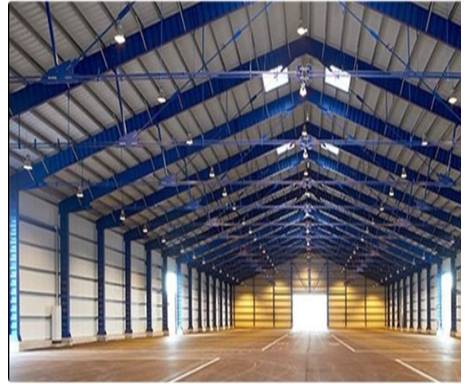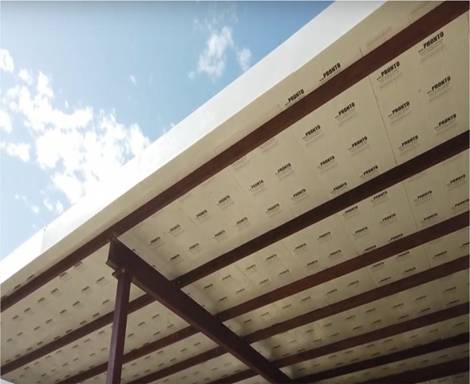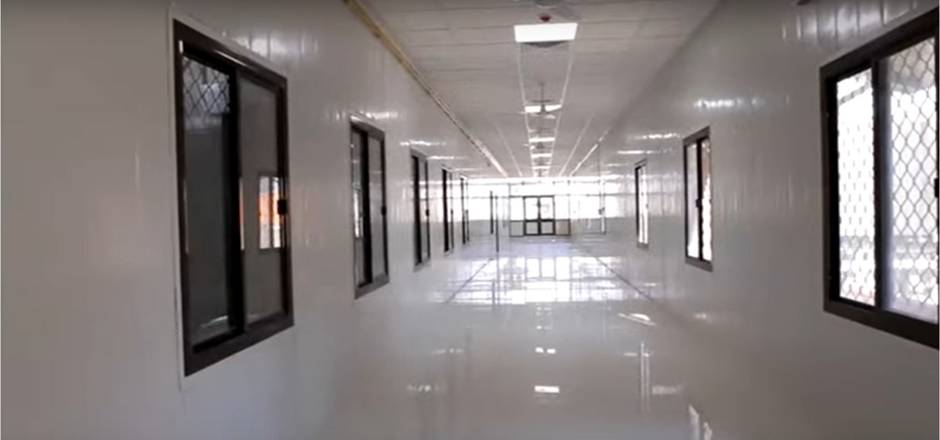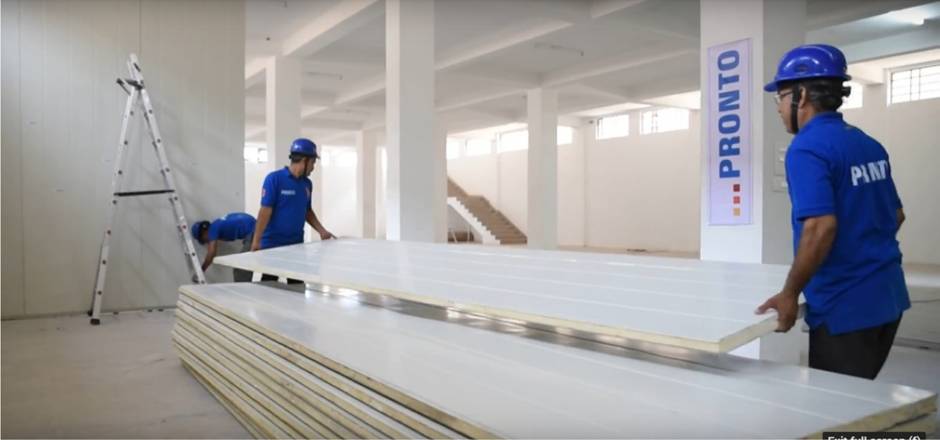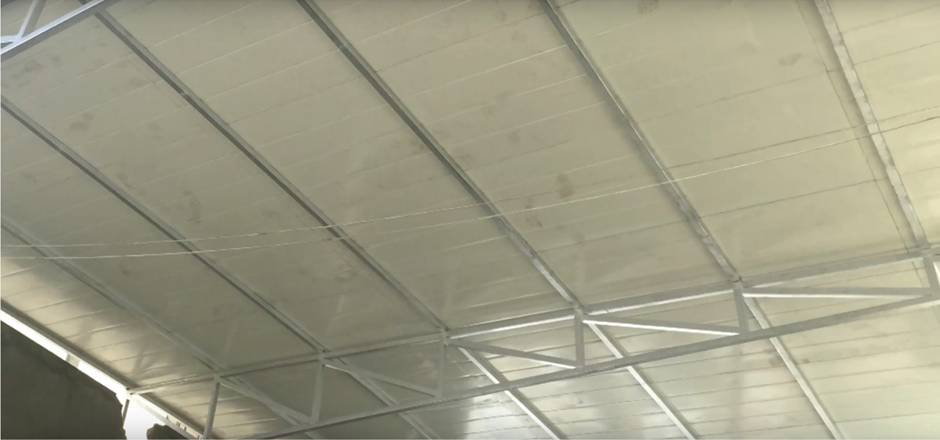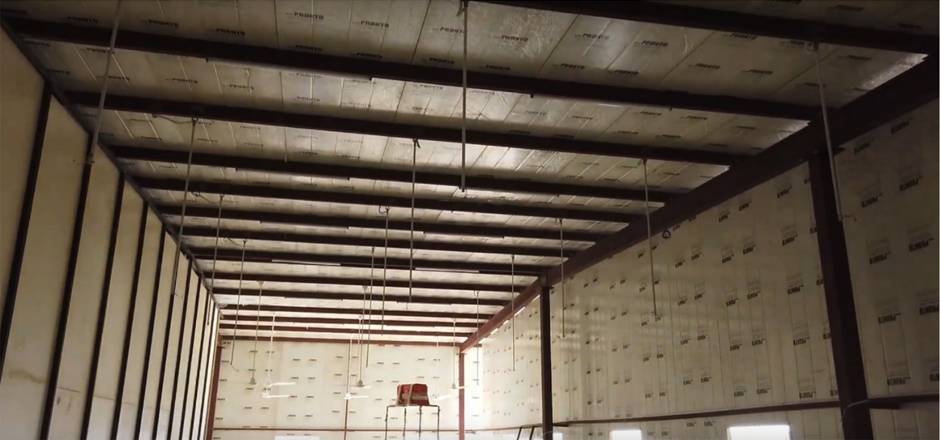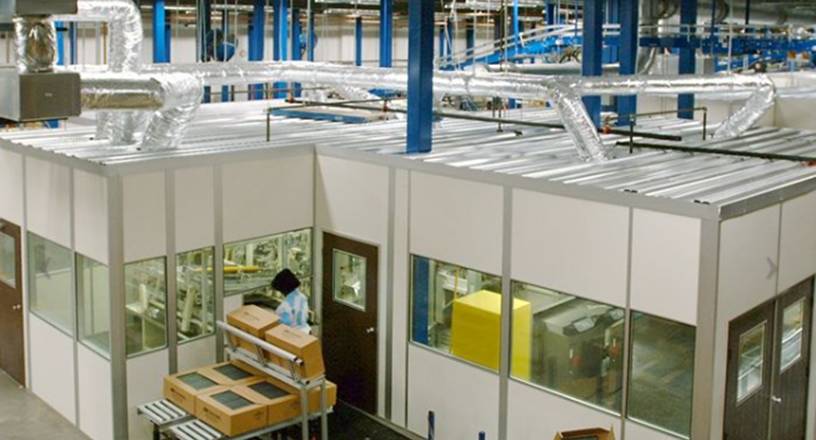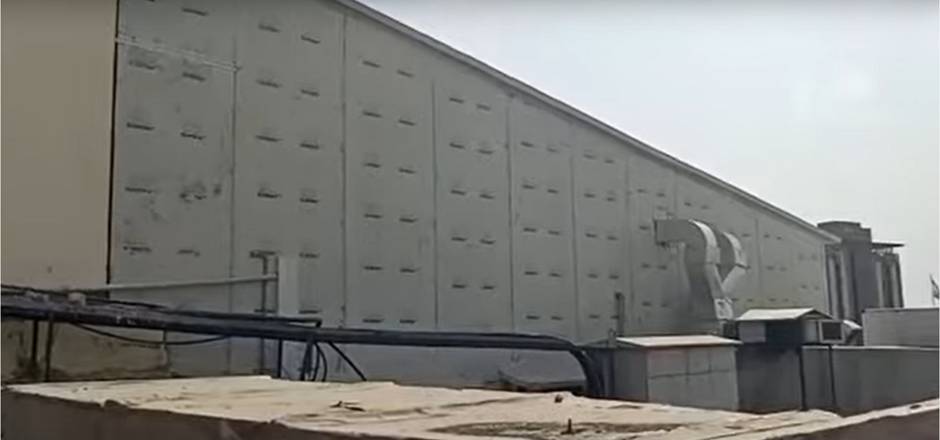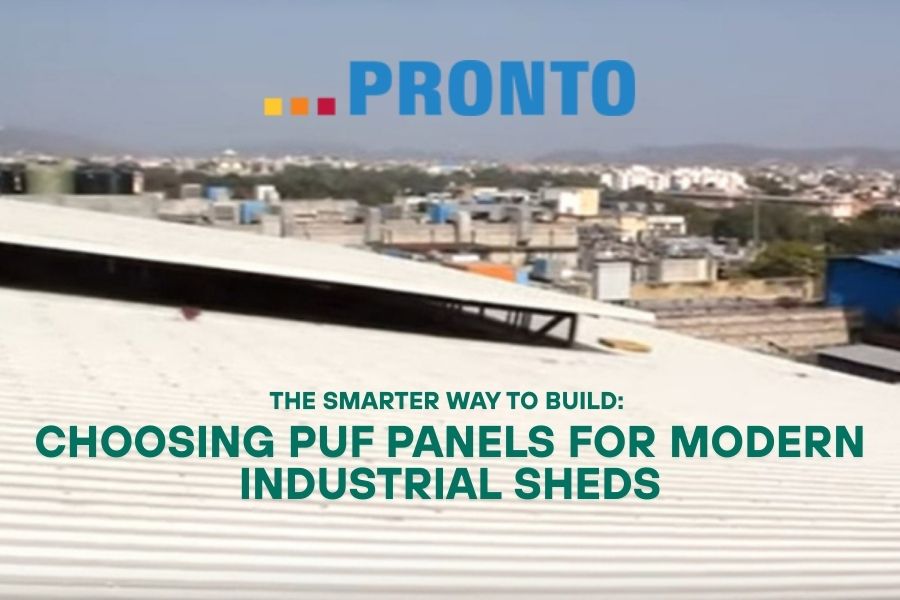
Is your factory suffering from water seepage through brick walls, damaging valuable machinery? Are leaking sheds leading to unhygienic working conditions? Are scorching heat and shivering colds troubling your workers? Do rusty, mold-infested roofs tarnish your modern industrial sheds or space, while constant temperature fluctuations disrupt productivity?
If these challenges sound familiar, you’re not alone. Many industrial facilities face similar issues that compromise efficiency, safety, and the longevity of assets. Traditional materials like brick, concrete (RCC), plain steel sheets, tin roofing sheets and asbestos cement sheets are still widely used for modern industrial sheds, but they come with several downsides that can affect cost, performance, and long-term usability.
It is always a challenge to find the right product to suit the needs of your industrial set-up. But here, you will find all the right reasons to choose modern PUF Industrial Sheds over any other traditional shed. In this blog, we’ll explore how switching to PUF Industrial Shed is a smart, sustainable solution that can transform your workspace into a durable, clean, and climate-controlled environment.
What are PUF Industrial Sheds?
Starting from the basics, PUF panel shed are pre-engineered building solutions made using PUF (Polyurethane Foam) panels for walls and roofing. These modern PUF industrial sheds are commonly used in industrial and commercial settings due to their excellent thermal insulation, durability, modularity, structural strength, and energy efficiency. The walls and roofs are made using PUF sandwich panels, which consist of:
- Outer layers made of Metal tin shed
- Core made of Polyurethane foam (PUF) that provides insulation and rigidity.
Most Common Uses of PUF Industrial sheds
- Warehouse
- Cold storage units and refrigerated rooms
- Factories and workshops (permanent/semi-permanent)
- Logistic centers
- Site offices and readymade rooms
- Portable cabins and modular structures
- PEB Construction
- Clean rooms and laboratories (e.g. pharma, food industries)
- Agricultural storage
- Food processing units
Benefits of using PUF Panels in Industries
PUF panels offer a bunch of solid benefits that make them a popular choice across many industries—especially where insulation, hygiene, and fast construction are priorities. Here are some the key advantages:
1. Superior Thermal Insulation
- Energy-efficient: Keeps interiors cooler in hot climates and warmer in cold ones.
- Reduced energy costs: Minimizes the load on HVAC systems, lowering electricity bills.
- Especially useful in cold storages, freezer rooms, and temperature-sensitive facilities (like pharmaceuticals or food processing).
2. Quick & Easy Installation
- Panels come pre-fabricated, so they can be installed quickly without heavy machinery.
- Helps reduce construction time and labor costs, which is a big plus in industrial projects.
3. Cost-Effective in the Long Run
- The low maintenance, reduced energy bills, and fast construction time make them cost-efficient over time.
4. Sound Insulation
- Offers decent acoustic insulation—important in industries like manufacturing or printing, where noise control matters.
5. Hygienic & Easy to Clean
- Smooth surfaces resist dust, mold, and moisture.
- Ideal for clean room environments like:
- Pharmaceuticals
- Food and beverage processing
- Electronics assembly
6. Fire retardant & Weather Resistance
- Depending on specifications, panels can be fire-retardant.
- Good resistance to rain, humidity, and corrosion makes them durable for exterior and interior use.
7. Lightweight, Yet Strong
- Easy to transport and handle, even at large scales.
- Reduces load on the structure, making them great for modular setups and requires less structural support.
8. Higher productivity achieved
- Using a PUF Roofing Sheets and sandwich wall panels in industrial units can significantly boost productivity in multiple ways—both directly and indirectly.
- Reduced delays, low energy costs, and less maintenance interruptions lead to higher productivity.
- Working capacity of workers is improved due to better insulation, cleaner environment; faster build time and less downtime.
9. Highly Modular
- PUF Panel industrial sheds are highly advantageous because of their higher modular applications.
- Prefab rooms; a smaller version of PEB, are readymade and quick to install.
- PUF Sandwich Panels structures are easily customizable, expandable, reconfigurable and re-locatable; which facilitates the changing needs of growing businesses or projects.
- Puf panel Partition for industries also provides great space optimization and multi-utility of the area.
10. Possess associative Scrap Value
- PUF panel have scrap (or resale) value; an underappreciated advantages, especially when compared to traditional materials.
- This value makes your structure a recoverable asset.
Demerits of using traditional materials for building Industrial Shed?
Traditional building materials like tin shed and RCC have their own drawbacks which eventually require either a lot of maintenance or add-ons to fit your needs. Here’s a breakdown of the most common problems with traditional materials in industrial shed construction:
1. Poor Thermal Insulation
- Materials like tin sheds, concrete, or brick walls conduct heat easily.
- In hot or cold climates, this causes temperature fluctuations, making it harder and more expensive to maintain a comfortable or controlled environment.
- Leads to higher HVAC bills and uncomfortable working conditions.
2. Condensation & Moisture Issues
- Tin sheets without insulation are prone to condensation on the underside, especially in humid areas.
- This can lead to rusting, mold, and even damage to stored goods or equipment.
4. High Energy Costs
- Due to poor insulation, you need to run fans, coolers, heaters, or air conditioning more aggressively.
- Traditional buildings can become heat traps or cold sinks, drastically increasing your energy bills.
5. Slower Construction
- Brick-and-mortar or RCC structures take weeks or months to build.
- Requires a lot of curing time, and more site management.
- Delays project timelines and increases overall costs.
5. Hygiene & Cleanliness Challenges
- Brick and cement surfaces are often porous, dusty, or hard to clean.
- Not ideal for industries like pharma, food processing, electronics, etc., where clean rooms or sterile environments are critical.
6. Limited Flexibility & Expansion
- Traditional buildings are hard to modify.
- If you want to expand or relocate, you usually have to demolish and rebuild, which adds waste and extra cost.
7. Maintenance-Heavy
- Metal roofing or sheets may corrode over time.
- Concrete walls may crack and require patching.
- Brick structures may suffer from dampness or plaster damage.
8. Asbestos cement Risks (if still used)
- Older sheds made with asbestos cement sheets pose serious health hazards.
- Handling or dismantling them requires special care and disposal protocols due to the cancer risk.
9. Fire Hazard & Lack of Safety Features
- Metal structures get extremely hot, and brick structures offer little protection for internal insulation.
- Without specialized coatings, these materials don’t inherently offer fire/heat safety.
How are PUF Industrial shed better than traditional industrial sheds?
Comparing a modern PUF panel industrial sheds to a traditional industrial shed (usually built with brick, concrete, or tin sheets), the Factory and Warehouse Shed built with Insulated Roofing Sheet version comes out ahead in several important ways—especially when you consider energy efficiency, speed of construction, and long-term maintenance.
Here’s a detailed comparison:
| Feature | PUF Panel Shed | Traditional Shed |
| Construction Speed | Very fast (prefab panels, modular assembly) | Slower (brickwork, curing time) |
| Thermal Insulation | Excellent (built-in insulation) | Poor (needs additional insulation materials) |
| Energy Efficiency | High – reduces HVAC costs | Low – more energy consumption |
| Hygiene & Cleanability | Smooth, cleanable surfaces (ideal for food/pharma) | Harder to keep sterile or dust-free |
| Structural Load | Lightweight but strong | Heavy; needs deeper foundation |
| Sound Insulation | Moderate (better than bare metal) | Poor (requires additional soundproofing added |
| Fire Resistance | Fire-retardant options available | Depends on materials; concrete is good, metal is poor |
| Weather Resistance | High – water, corrosion, and UV-resistant | Low – metal corrodes, concrete may crack over time |
| Maintenance | Low – durable and corrosion-resistant | Higher – especially for metal parts |
| Flexibility | Modular and expandable easily | Permanent, hard to modify |
| Eco-friendliness | More energy-efficient, some panels are recyclable/reusable | Less energy-efficient, more material waste |
Real-World Use Case
For instance, a cold storage facility constructed with a tin shed would require separate insulation installation and would likely incur high cooling expenses. In contrast, a unit built with insulated wall panels and PUF sandwich roofing sheet already includes integrated insulation, making it quicker to assemble and more cost-effective to operate.
Similarly, when container house are repurposed for industrial or residential use, they often demand extensive reconstruction, fabrication, and added insulation for temperature and sound control. On the other hand, readymade rooms made from PUF panels offer a superior solution—they come with built-in insulation and require minimal on-site labor, resulting in faster installation and greater efficiency.
Conclusion
Overall, traditional construction materials; like tin shed; fall short when it comes to meeting the demands of modern industries. They tend to be slower to build, offer inadequate insulation, consume more energy, demand frequent maintenance, and lack the adaptability required in today’s fast-paced environment.
On the other hand, Industries increasingly prefer PUF panel sheds for a variety of practical and economic reasons. One of the most compelling benefits is energy efficiency, which is especially critical in climate-sensitive sectors such as cold storage, pharmaceuticals, and food processing. These panels offer excellent insulation, helping to maintain internal temperatures and reduce energy consumption. Additionally, Sandwich PUF panels significantly reduce construction time, allowing operations to begin weeks or even months earlier than traditional building methods.
Over time, they prove to be cost-effective, thanks to their low maintenance needs and reduced operational expenses. Also, better insulation, cleaner working conditions, quicker construction, and minimal downtime all contribute to significantly improved productivity. Moreover, insulated roof sheets are compliance-friendly, as they meet the hygiene and insulation standards set by many regulatory authorities, making them Pronto Panels an ideal choice for modern industrial applications. Whether you manage storage or operate a full-scale production unit, PUF panels deliver a more efficient, stable, and scalable solution.
If you’re considering building an industrial shed in today’s world, options like PUF panels, Insulated Roof Panels, pre-engineered buildings (PEBs), or PUF sandwich wall panels are far more suited to contemporary operational, environmental, and cost-effective expectations.

